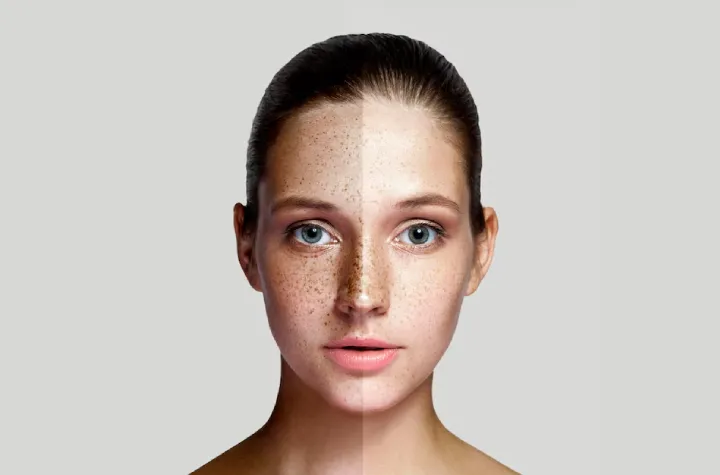Broadly, there are three types of skin pigmentation disorders:
1. Hyperpigmentation:
If abundant melanin pigment is localised in a particular area of the skin, the skin of that site appears darker as compared to the surrounding skin. This kind of pigmentation irregularity is known as hyperpigmentation.
Common forms of hyperpigmentation include:
1. Sunspots (Solar lentigines):
These are well-defined dark spots that form due to prolonged skin exposure. Often, they appear in aged people but can even be seen on the skin of people who spend much of their time outdoors in the daytime without sun protection.
2. Freckles:
These are small, brown, flat, circular spots on the skin that are mostly seen in light-complexioned people who have been frequently or overexposed to the sun’s UV rays.
3. Melasma:
It is a facial skin hyperpigmentation disorder characterised as irregular, brown to grey patches on the skin of the cheeks, jawline, and nose. Most commonly, it is observed in pregnant women.
4. Post-inflammatory hyperpigmentation:
This form of hyperpigmentation develops as a response to injuries to the skin such as burns, acne breakouts, bruises, friction, or skin exposure to harsh chemical-based treatment. Visit Delhi Wellness Clinics, pigmentation treatment clinic in Delhi to get the best skin brightening treatments and achieve a clear smoother that is free from any type of pigmentation.
2. Hypopigmentation:
If the melanin production and deposition are less in a particular area of the skin, the skin of that site appears lighter as compared to the surrounding skin. This type of pigmentation irregularity is known as hypopigmentation.
Skin conditions that fall under this category of skin pigmentation disorder include:
1. Vitiligo:
It is an autoimmune, chronic condition where pale patches appear on the skin. It results in a lack of melanocytes which is responsible for melanin production.
2. Albinism:
It is an inherited hypopigmentation disorder where the skin appears pale. It leads to reduced melanin content in the skin and a lack of skin pigmentation.
3. Pityriasis alba:
This condition presents on the skin as slightly inflamed patches that can lose melanin pigment over time. Mostly, it is observed in dark-skinned people.
4. Pityriasis versicolor:
This is a fungal skin infection. The growth of fungus on the skin can cause lightening of the skin in dark-skinned people.
5. Depigmentation:
If the skin loses all its pigment and appears completely white, this condition is called depigmentation. Vitiligo is a well-known depigmentation condition caused by immune cells attacking the skin’s melanocytes. It leaves the skin more sensitive to the sun.
Dermatologist at Delhi Wellness Clinics, offers best skin darkening treatment in Delhi. These treatments are also customised to deliver best outcomes.

